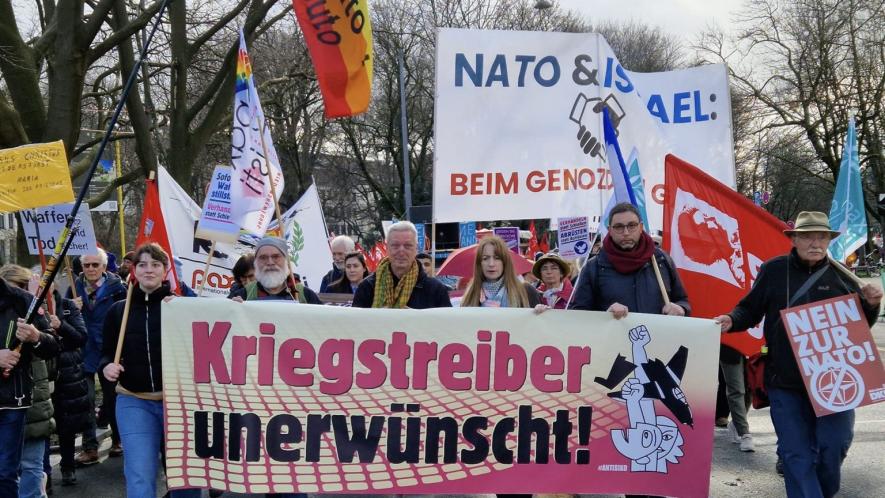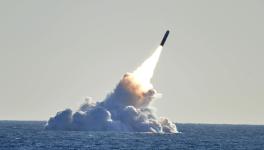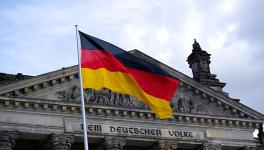German Economy on the Brink

From the protest in Munich (image via DKP Giessen)
Germany faces an intensifying economic crisis. In August, business confidence once again deteriorated. Economic stagnation or even a recession is expected at best for 2024. The major German car manufacturer, Volkswagen, is no longer ruling out plant closures. The government's policies bear special responsibility for this. With its miserable energy policy, it has nothing to counter price increases, which ultimately jeopardise the competitiveness of German industry.
The governing coalition – of Social Democrats, Greens and Liberals – must now even work under severe budgetary constraints. The billions of euros that Germany sends to Ukraine in military and no administrative funds have taken their toll, as have dramatic increases in Berlin's own military spending in excess of $100 billion.
The enormous cuts imposed on essential infrastructure, such as Deutsche Bahn, have made the country unrecognisable; the rail network is dilapidated, and riders endure severe delays daily. A dire shortfall in money for education means that by the end of primary schooling, one in four children cannot read, write or do arithmetic properly.
Now, a major dispute has emerged within the government over the sum of financial aid to Ukraine. The ruling coalition, betting on a Ukrainian victory in the NATO proxy war against Russia, opposes peace negotiations and has already transferred over 40 billion euros to Kiev (after the US, Germany is its largest weapons supplier). According to discussions, Ukraine aid is to be held constant in next year's budget, partly because further options are being sought within the G7 framework, through the expropriation of frozen Russian assets.
More people are now debating whether the government's strategy, positioning Berlin as a de facto belligerent in the Ukraine war in thrall to Washington, was ever a promising one. Germany's participation in the West's economic warfare has not ruined Russia, as Foreign Minister Annalena Baerbock postulated in 2022.
The punitive measures imposed on Moscow have instead ricocheted, causing extensive self-harm, not least in the resulting massive rise in domestic energy and food prices. All that Berlin achieved through sanctions was an Asian turn in Russian energy policy. Rather than selling to Europe, Russia now sells gas and oil primarily to India.
New Delhi ought to be sending Berlin a bouquet of flowers every day for relinquishing Russian energy. Europe has squandered German industry's competitive advantage recklessly, demolishing a reliable, cheap energy supply in the mistaken belief that doing so would cause or at least hasten the collapse of the world's largest country. The case illustrates how deeply the present is shaped by a German history of hubris and an arrogant underestimation of Russia.
Popular scepticism of Berlin's conduct in the Ukraine war will only increase the longer the promised victory over Russia fails to materialise. While the governing coalition supported the April 2022 US-UK initiative to scupper negotiations between Russia and Ukraine, polls show a clear majority, 68%, back peace negotiations with Russia. As many as 65% favour an offer to Russia to declare an immediate ceasefire in Ukraine in return for a cessation of hostilities.
Foreign policy will be central to the autumn 2024 elections in Germany's eastern states. The new party “Bündnis Sahra Wagenknecht” (BSW) achieved double-digit results in the state elections in the two eastern German states of Thuringia and Saxony from a standing start. It calls for diplomacy, an end to financial aid to Ukraine, and rejects the stationing of US missiles in Germany announced by President Joe Biden, with Chancellor Olaf Scholz, at this summer's NATO summit in Washington. Military experts contend that a realisation of the missile deal would expose the German population to an immense risk of nuclear war with Russia.
The BSW's combined Left-wing and conservative profile at the same time could shake up the established party system in Germany. Emerging from a declining Left party that had abandoned traditional Left-wing concerns – peace and justice for workers – in favour of a woke identity politics, the call for arms deliveries and an open border policy, the BSW is the only political force capable of checking the ascent of the Far-Right Alternative for Germany. The BSW is also disproportionately supported by migrants opposing uncontrolled immigration, partly because they view it as a major cause of deteriorating living standards.
The BSW prizes the struggle for full democratic sovereignty – lacking in Germany nearly eight decades after the end of the Second World War, as revealed by the Washington announcement of new US missile deployments. Within the NATO framework, based neither on defence nor on shared values, the US relies on countries like Germany for confronting Russia and China. In the eastward NATO expansion it pushed, violating its assurances of restraint, Washington has contributed to the conflict in Ukraine, which is now effectively a proxy war between NATO and Russia.
A 1954 treaty on foreign armed forces allows the right to US troops to be stationed in Germany. But Berlin has come to resemble a client of imperial Rome – domestically autonomous, but obliged to surrender its foreign interests to those of empire. Some in Asia may see NATO's arrival as heralding liberty, but experience warns against this misjudgement.
Involvement with NATO risks erosion of democratic sovereignty and, above all, a detrimental subordination of one's politics to US corporate interests. In the end, this harms its own policy and forces a confrontation in which third parties benefit according to the motto of British imperialism “Divide and Rule”.
Sevim Dagdelen is foreign policy spokesperson for the BSW (Sahra Wagenknecht Alliance - Reason and Justice) group in the German Bundestag and chairwoman of the Foreign Affairs Committee. LeftWord has just published the English edition of her book, ‘NATO: A Reckoning with the Atlantic Alliance.’ The views are personal.
Get the latest reports & analysis with people's perspective on Protests, movements & deep analytical videos, discussions of the current affairs in your Telegram app. Subscribe to NewsClick's Telegram channel & get Real-Time updates on stories, as they get published on our website.























